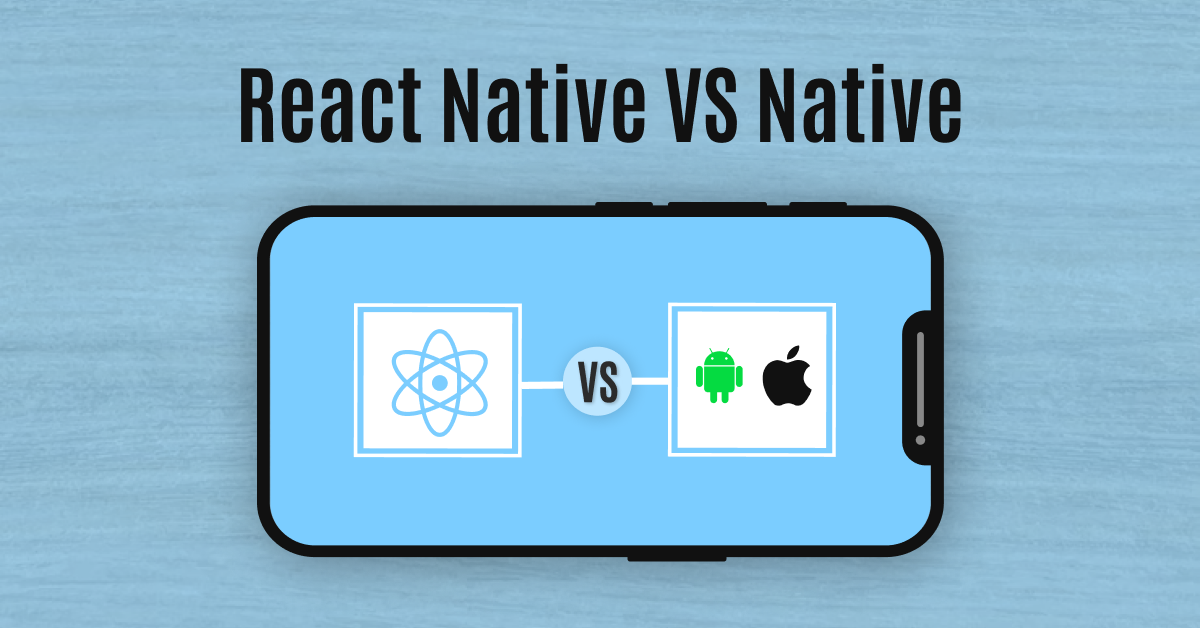
React Native vs. Native: A Comparative Analysis
By deftsoft
25th June 2024
Web and mobile developers are looking for novel frameworks and methodologies to flourish robust applications. With the increased adoption of a variety of UI software toolkits to develop iOS, Android and cross-platform apps, React Native vs native remains a constant point of attraction.
As per a survey in May 2024, mobile apps are projected to generate a market revenue of over $935 billion in 2024. In this rapidly evolving landscape, mobile and web developers are constantly grappling with the choice between traditional native iOS and Android app development and the time-saving React Native app development.
This blog is a resourceful guide if you want to comprehend what’s better for mobile app development: React Native vs native app development. We will discuss what native and React Native app development is, factors to consider when choosing the right framework for your app and finally, the significant advantages and disadvantages of the two mobile app development approaches.
Stay with us till the end to gain practical insights that can simplify your next mobile app development project, making your work more efficient and effective!
What is Native?
A native app is an application that is built separately for iOS and Android operating systems. It means that when a developer wants to build an Android app, he’ll make use of Java or Kotlin as programming languages. On the other side, if he wants to build an iOS app, he will use Swift or Objective-C programming languages.
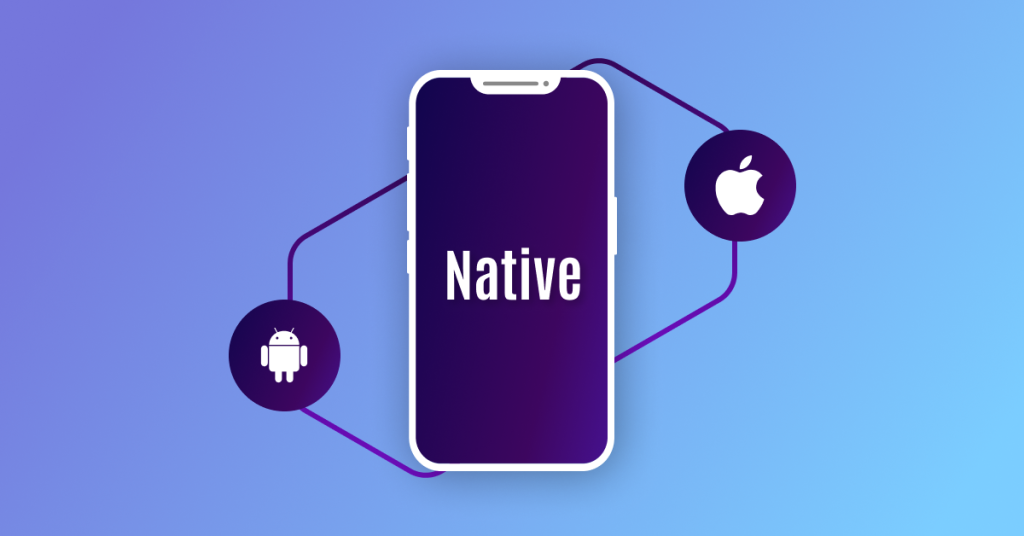
Through the native app development approach, users can create high-quality applications for a specific platform, ensuring optimal app performance and a seamless user experience. Native apps can be built by using various popular coding platforms, such as Android Studio for developing Android mobile applications and Xcode for developing iOS applications.
What is React Native?
React Native is a UI software framework that consists of programming languages, libraries and frameworks dedicated to building cross-platform mobile and web applications. This means that you can build both iOS and Android apps by simply using a single codebase. You just need to code once and build fully functional apps for multiple operating systems.
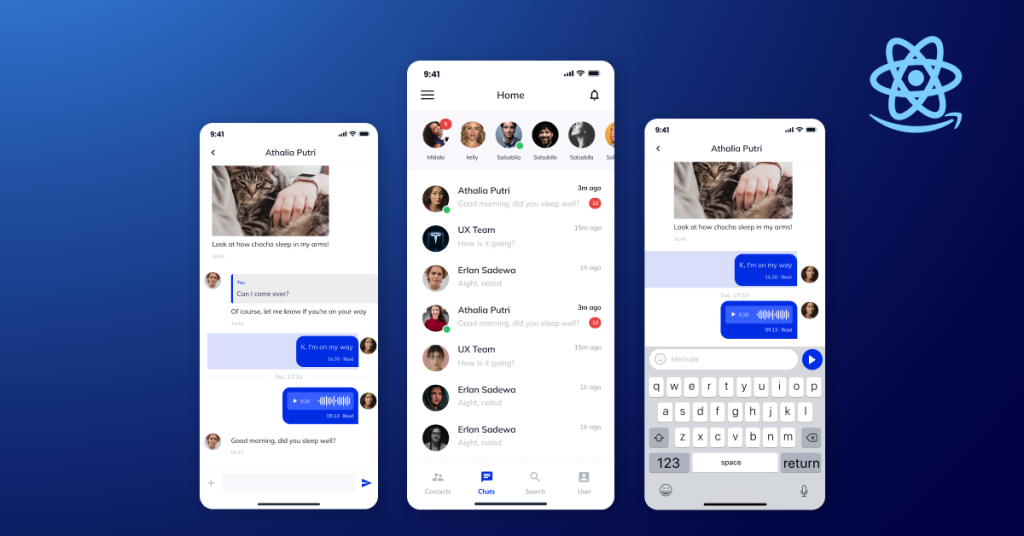
The React Native framework was introduced by Facebook in 2015 as a time-saving alternative for native app development. Building a cross-platform app from a single codebase and minimal resources is quite a fair deal for numerous mobile and web app developers.
The developers can quickly develop high-performance applications using programming languages such as JavaScript and React. Many developers have switched to the React Native approach due to its feasibility and minimum resource requirement.
What are the Factors to Consider in React Native vs Native Comparison?
If you’re keen to understand the difference between React Native vs native app development, there are some key factors to consider when choosing the right approach for your project. The following are some of the most noteworthy factors to consider when choosing the best choice for your project:
- Does Your Project Need High Speed?
Suppose that you’re working on a complex game project that requires high-speed response. This is when you need to opt for native app development. Another instance is when you’re building an app that requires in-depth internal API calls and other set of complex services such as sensors, broadcast receivers and threads, then native app development is the right choice for you.
On the contrary, if you’re building an app like an online clothing store, it doesn’t require complex internal API calls. This is when you can choose React Native.
- Do You Have a Limited Budget?
The real question of choosing React Native vs native development is when you have limited resources. It costs a lot more to develop a native app for a dedicated platform than to develop multi-platform apps from a single codebase. If budget is a constraint for you, choosing React Native for cross-platform app development is a judicious choice.
- Are You Comfortable with Web Technologies?
If you’re a web developer comfortable with web technologies and have a comprehensive experience with them, then React Native is the smarter choice for you. However, if you’re familiar with Java or Kotlin, then native app development is the best choice for you.
Now that you know what questions to ask before choosing the right framework for your project, let’s discuss the advantages and disadvantages of React Native vs native mobile app development one by one.
What are the Advantages of Native App Development?
The significant benefits of native app development are as follows:
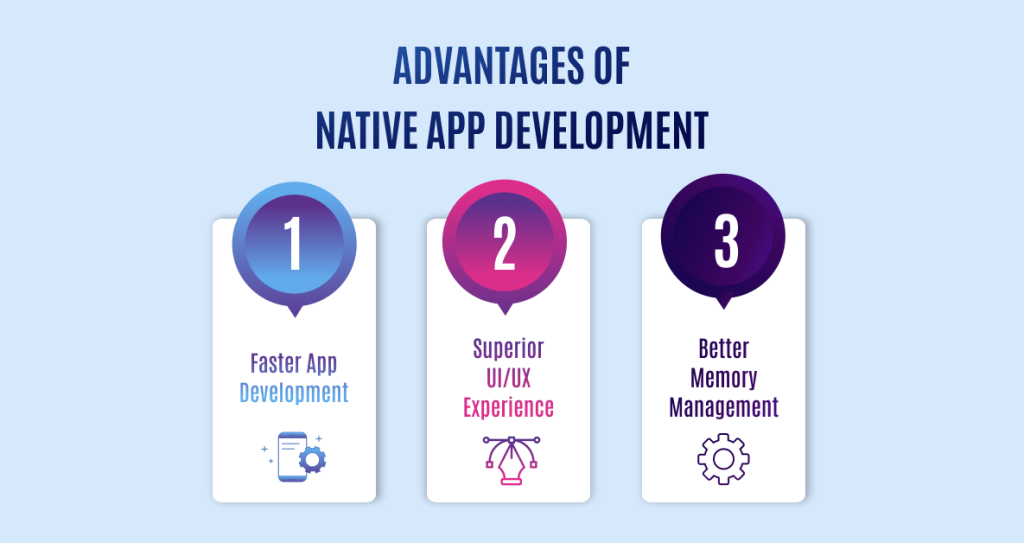
- Faster App Development
Native app development is quick and robust because it interacts well with hardware. Native apps are developed using native programming languages such as Kotlin, Java, Objective-C, Swift, etc., and native APIs that function faster than React Native app development. Therefore, native app development offers a faster response time.
- Superior UI/UX Experience
One of the major benefits of native app development is the availability of multiple customization options for developing iOS and Android apps. The native apps strictly follow User Interface (UI) guidelines and standards for each of the dedicated platforms, be it Android or iOS app development. Developers can also choose a variety of fonts, icons and animations for their app.
- Better Memory Management
Native app development is the best choice for building a complex and resource-intensive application. They have better memory allocation as compared to react native applications.
What are the Disadvantages of Native App Development?
The following are the major disadvantages of native app development:
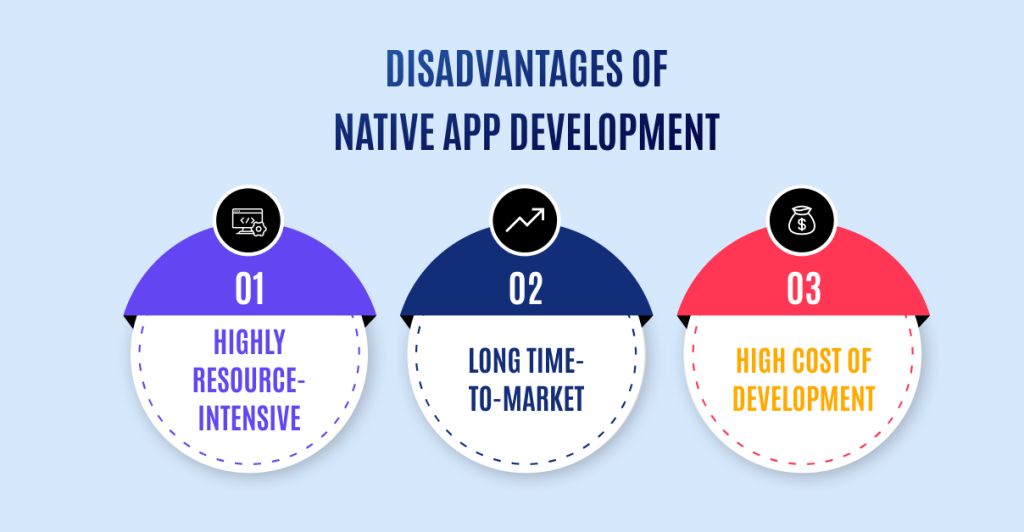
- Highly Resource-Intensive
It becomes quite challenging to maintain different codebases for separate applications for iOS and Android. Especially during the time of making updates, it becomes difficult to perform upgrades with such complexity. Sharing the code between two different operating systems also becomes a daunting task.
- Long Time-to-Market
Since native app development focuses on writing separate codebases for iOS and Android apps, it eventually takes time to launch the final app and bring it to the market. Developing native apps also takes dedicated massive teams of developers, UI/UX designers and testers who need to be proficient in native programming languages. Sometimes, it gets difficult to stay up-to-date in the fast world of technology.
- High Cost of Development
Because of high maintenance and update costs, native app development is relatively costlier than leveraging React Native for cross-platform app development.
What are the Advantages of React Native App Development?
Here are some of the significant advantages of React Native app development that make it a better choice than native app development:
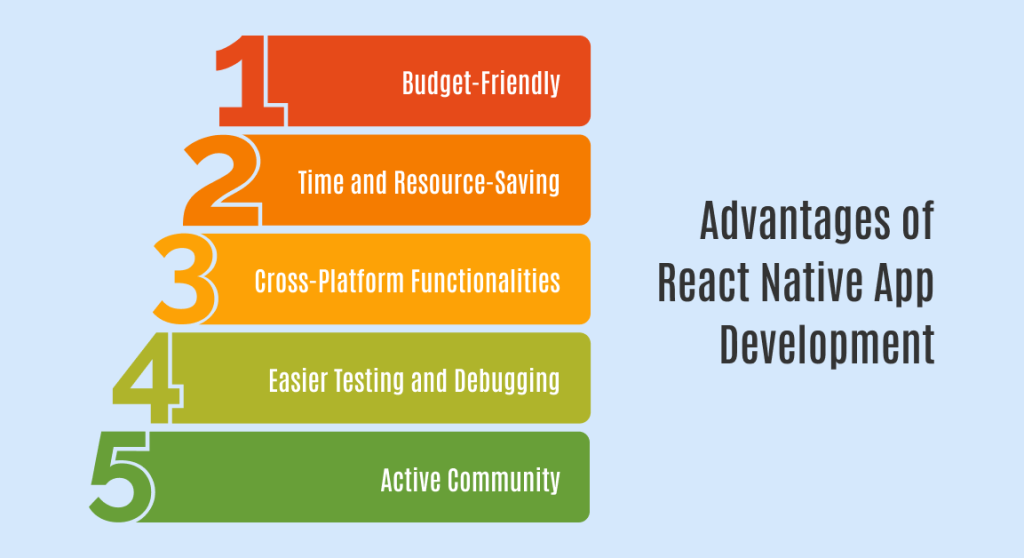
- Budget-Friendly
Since React Native offers a common interface to write the codebase for both iOS and Android apps, React Native app development is very economical. If you’re a startup or mid-sized business organization, React Native is a wonderful choice of framework for saving money and building cross-platform apps.
- Time and Resource-Saving
Building cross-platform apps requires a minimum amount of resources and workforce. You can easily find JavaScript and React programmers in the industry who can help you bring your vision to life. Since there is a single codebase for writing code for both iOS and Android apps, the React Native approach is affordable and economical.
- Cross-Platform Functionalities
It’s every app developer’s dream to write code just once and then deploy it for all the platforms. React Native framework provides this exact flexibility to the developers and provides a uniform experience to the users across a variety of platforms. Therefore, it significantly reduces the app development time and offers an interactive experience to the users.
- Easier Testing and Debugging
React Native offers a plethora of sophisticated tools for testing and debugging applications. Some of the significant tools include Expo and Reactotron. These tools are reliable and offer enhanced functionalities for debugging and testing cross-platform apps.
- Active Community
React Native has an active community and massive user base that constantly contributes to improvement and bug-fixing suggestions. The active community plays a significant role in considering the React Native codebase as a reliable and credible choice of framework.
What are the Disadvantages of React Native App Development?
The following are the primary disadvantages of React Native app development:
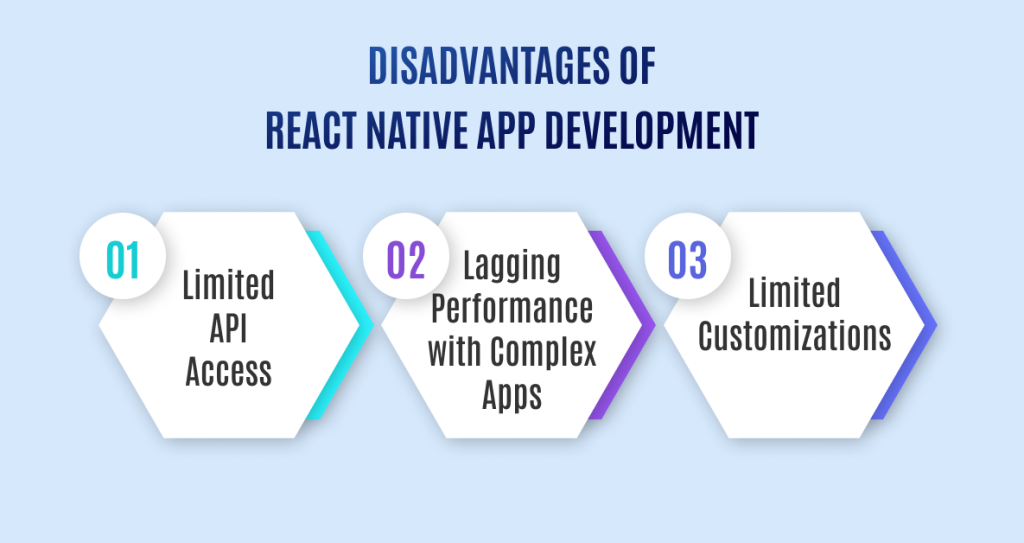
- Limited API Access
You cannot fully access the native features such as native APIs when developing iOS and Android apps through React Native. Cross-platform app development add some constraints to the mobile and web developers in creating apps.
- Lagging Performance with Complex Apps
React Native is a considerable choice for app development when building a general app. However, if you’re creating an app that has complex functionalities, the React Native framework seems to slow down and work inefficiently. Developers see themselves facing issues when working with large datasets or complex animations. The reason is that React Native functions over a JavaScript bridge that communicates with native modules which creates delays in the performance.
- Limited Customizations
Developers cannot gain complete access to native device features or functionalities that are available when creating native apps for iOS and Android. Therefore, developers struggle to add customized features to Android and iOS apps.
Conclusion
The battle of React Native vs Native app development stands strong when talking about web and mobile app development. If you’re a business organization or a startup that wants to get a native or cross-platform app developed, you must invest in a reliable React Native development company that offers customized solutions.
Deftsoft has a team of seasoned mobile app development professionals from which you can hire React Native developers for your project. We’ll offer you customized native and React Native app development services. Reach out to know more!
FAQs:
1. What is the difference between Native and React Native app development?
Native app development involves creating applications for a single platform, using Swift or Objective-C for iOS, and Java or Kotlin for Android, ensuring high performance and superior user experience. React Native, a cross-platform framework, uses JavaScript and React to build apps for both iOS and Android, streamlining development and reducing costs.
2. What factors should I consider when choosing between React Native and Native app development?
Native development is preferable for projects requiring high-speed performance, intensive API calls, or complex functionalities. React Native is cost-effective, allowing code reuse across platforms and reducing development time. Team expertise is crucial; web technology proficiency favors React Native, while platform-specific language skills favor native development for customized user experiences.
3. What are the advantages of Native app development?
Native apps, optimized for their respective platforms, offer superior performance and responsiveness. They provide an enhanced user experience through detailed customization and adherence to platform-specific UI/UX guidelines. Developers can fully leverage device capabilities, such as sensors and cameras, without restrictions. Additionally, native apps seamlessly integrate with the device’s OS, ensuring smoother and more reliable functionality.
4. What are the advantages of React Native app development?
Using a single codebase for both iOS and Android reduces development costs, accelerates the development process for quicker time-to-market, and ensures a consistent user experience across platforms. With support from an active developer community, this approach requires fewer developers, making it ideal for startups and small businesses.
5. What are the disadvantages of React Native app development?
React Native may struggle with complex apps featuring heavy animations or large datasets, potentially leading to performance issues. Limited access to certain platform-specific APIs can restrict functionalities. Developers might encounter difficulties in implementing highly customized features and achieving the same refinement as native apps. The JavaScript bridge can introduce latency, affecting performance in resource-intensive tasks.




